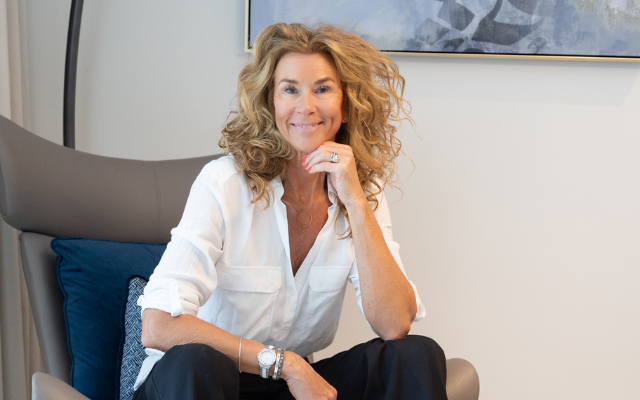
Our Global Expert Hub is here! Elevate your professional and personal journey with inspiring women from our community, bringing you expert insights in our three key areas: Business, Career, and Wellbeing.
We kick off with our menopause expert Anna Wallace-Scot who’ll share with us who she is, what she does and how she can help you.
Introduction
Hello! I’m Anna. Originally from Sweden, I’ve spent much of my adult life living in various countries, including Tanzania, the USA, and the UK. Most recently, I spent 15 years in the lush jungles of Borneo, Brunei, before moving to Qatar. I’m a holistic midlife coach and consultant with over 20 years of experience in the wellness field.
What Inspired Me – My Story
My passion for working with women has always been my calling. Unfortunately, much of medical research has historically focused on men, leaving a significant gap in understanding the unique functions of the female body. This often results in health advice found online or on social media that can do more harm than good.
I’m particularly excited to open up conversations about perimenopause and menopause—phases of life that all women experience. The more educated we are, the better decisions we can make for ourselves.
I initially thought my perimenopause began at age 46 when I started experiencing irregular periods. However, looking back, I realize it likely started around age 43. I mistakenly believed that perimenopause was just a straightforward transition to menopause, not realizing the challenging journey it would entail.
I had no idea that progesterone and estrogen could fluctuate erratically over the years of perimenopause, causing symptoms that were both mental and physical. I used to think menopause symptoms were limited to hot flashes and night sweats, but I quickly learned it was so much more.
I experienced sudden, heavy periods that felt like tsunamis. I had erratic heartbeats at night for no apparent reason. Out of the blue, I dealt with recurring UTIs, and alongside my periods, I faced these unexpected health issues.
When I visited my GP, she told me, “Oh no, you’re too young to be peri- menopausal. The suggestions for my recurring UTIs included wearing cooler, lighter clothing and showering immediately after workouts. While this advice was helpful, it felt inadequate. I had never experienced a UTI before; this should have been a warning sign. Vaginal dryness was also a contributing factor. Frustrated, I began my own research and discovered that those harmless palpitations were a classic sign of falling estrogen levels. I learned that estrogen receptors exist throughout our bodies and that vaginal dryness can signal dwindling estrogen, contributing to my UTIs.
It became a vicious cycle: treating UTIs with antibiotics led to depleted gut bacteria, worsening my overall health. Ultimately, it took me six years of investigation, study, and self-discovery to get back on track.
Now, I can confidently say that I have a solid set of tools to navigate this phase of life. I feel great and am passionate about helping educate other women, so they don’t have to endure what I went through.
Your menopause symptoms checklist, to name just a few!
I provide all my clients with a symptom checklist featuring over 25 different symptoms, both mental and physical. In reality, there are over 250 menopausal symptoms! Here are just a few examples:
- Anxiety and panic attacks—very common
- Breathing difficulties
- Concentration challenges
- Joint pain
- Feeling tense and nervous—really common
- Constipation
- Persistent fatigue
Remember, whatever you hear from your practitioner or if your blood tests come back “normal”—symptoms never lie! You are not alone, and you are not crazy. If you’re not feeling great, something is wrong.
Also, it’s important to highlight that perimenopause can start well before you notice any irregular periods.[/vc_column_text][/vc_column][/vc_row][vc_row][vc_column][vc_column_text css=””]Challenges for Well-Being in Perimenopausal Women
Navigating the journey of perimenopause can be challenging, and many women face unique hurdles that impact their well-being:
- Increased Stress Levels
Hormonal fluctuations during menopause can amplify stress responses, leading to feelings of anxiety and overwhelm. This can make daily responsibilities feel even more daunting. - Burnout
Juggling a career, family, and personal wellness becomes particularly tough during this time. Many women find themselves balancing multiple roles, which can result in physical and emotional exhaustion. - Lack of Time
With so many responsibilities, carving out time for self-care often feels impossible. Women frequently prioritize the needs of others, unintentionally neglecting their own wellness. - Hormonal Imbalances
The decline in estrogen and progesterone during perimenopause can bring about fatigue, mood swings, and sleep disturbances, complicating both stress management and overall well-being.
Holistic Well-Being Tips
- Prioritize Self-Care
I encourage women to carve out dedicated time for self-care activities, whether it’s exercise, hobbies, or simply relaxing. Even small, consistent efforts can lead to meaningful change. - Implement Stress Management Techniques
Incorporating mindfulness practices like meditation or yoga can be incredibly beneficial for managing stress. Simple deep breathing exercises can also help reduce anxiety and promote a sense of calm. - Adjust Nutrition
A balanced diet rich in protein and whole foods can significantly support hormonal health. I recommend including omega-3 fatty acids and leafy greens while minimizing processed foods and sugar, which can worsen mood swings. - Optimize Sleep
Though it can be easier said than done, quality sleep is essential for overall health. Good sleep hygiene practices—like maintaining a regular sleep schedule, creating a restful environment, and limiting screen time before bed—can help combat insomnia and fatigue. - Stay Physically Active
Regular physical activity is a powerful tool for managing weight, reducing stress, and boosting mood. Finding enjoyable forms of exercise, whether it’s walking, swimming, or group classes, can make all the difference. - Seek Support
I highly encourage women to connect with support groups or seek professional coaching or counseling. Sharing experiences and gaining insights can help reassure them that they are not alone in their struggles. - Work with a Hormone Specialist
Consulting with a healthcare professional like myself can help explore hormone therapy options or other treatments that alleviate menopause symptoms. Tailored approaches can greatly enhance hormonal balance and overall wellness. - Set Boundaries
Encouraging clear boundaries around work and personal life is vital. Learning to say no can prevent overwhelm and ensure that there’s time for much-needed self-care.
Actionable Wellness Practices
Three quick tips how I improve my hormones
Tip #1: Get Sunlight Exposure Within One Hour of Waking Up
Why It Helps: Morning sunlight helps reset your internal clock. It optimizes your metabolism and improves your cortisol and makes it easier to fall asleep at night.
How to Implement:
- Spend 5-15 minutes outside soon after waking.
- Connect this to a morning habit, like having salt & lemon water, breathing exercises or stretching.
Just 15 minutes of sunlight exposure—even on cloudy days—can significantly regulate your circadian rhythm, which is your body’s internal clock governing sleep-wake cycles and various physiological processes.[/vc_column_text][/vc_column][vc_column width=”1/2″][vc_single_image image=”8973″ img_size=”large” alignment=”center” css=””][/vc_column][/vc_row][vc_row][vc_column][vc_column_text css=””]Here’s how natural sunlight exposure works:
- Suppresses Melatonin: Sunlight reduces melatonin, the hormone that induces sleepiness, helping you feel more alert and awake.
- Synchronizes Your Body Clock: When light enters your eyes, it stimulates a specific area of the brain that regulates your internal clock. This synchronization ensures that your body and metabolism function optimally.
- Boosts Serotonin Levels: Exposure to sunlight increases serotonin, a neurotransmitter linked to happiness and well-being. Higher serotonin levels during the day can enhance your mood and improve your sleep at night.
- Improves Sleep Quality: By setting your internal clock in the morning, you’ll find it easier to feel sleepy at night, leading to better overall sleep quality.
Furthermore, regulating your cortisol levels through sunlight exposure can also improve insulin sensitivity, support thyroid function, and even influence sex hormones and body fat.
This may sound surprisingly simple, but the benefits can be profound—and best of all, it’s completely free!
Tip #2: Increase your protein intake.
Why it helps: The older we get the more anabolic resistant we are to protein,this is why we need to eat more protein. 30g is the minimum amount needed to trigger muscle protein synthesis to help build new muscle tissue. Anabolic resistance means that our muscles just don’t ‘sense” the amino acids in protein and don’t respond to it as well.
How to Implement: Include and prioritize PROTEIN. I recommend a minimum of 30g + at every meal.
Tip #3: STOP overdoing cardio and include weight training exercises.
Why It Helps: Muscle preservation, to maintain muscle mass which naturally declines as we age. Lifting weights enhances bone density, reducing the risk of osteoporosis and fractures. Overdoing cardio at this stage of life increases stress which causes inflammation. The last thing we need in an already inflamed body.
How to Implement:
- Start small. If you are new to weight training, hire a Personal Trainer.
- If you love doing exercise classes, swap to a weight-based class.
My Mission – Call to Action
I aim to educate women on how to optimize their health, empowering them to grow stronger and more confident in both body and mind.
Key Service
- Holistic Health & Wellness
- Hormone & gut regulation
- Menopause nutrition
- Sleep & stress management
- Exercise & weight management
- Mental health, attitude & mindset
I offer keynote speaking, seminars & lectures, one-to-one coaching, group coaching, tailoring my expertise to best meet your needs.
How My Services Help Women
My practice is dedicated to helping women become stronger, healthier, and more confident in their own skin. I believe that by continuously learning and evolving, I can empower you with the knowledge to improve your well-being. No matter your current state, you can always feel better—because knowledge is power.
Find out more about Anna
- Instagram: @holisticmidlife
- LinkedIn: https://www.linkedin.com/in/anna-wallace-scott
- Website: https://holistic-midlife.com/



